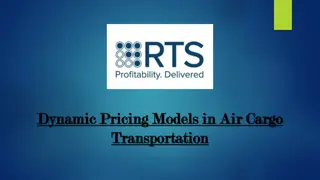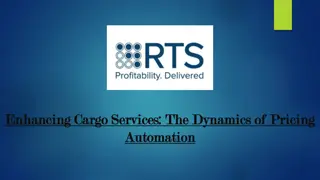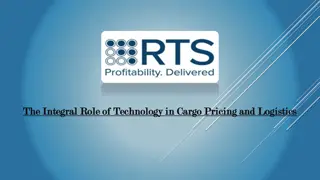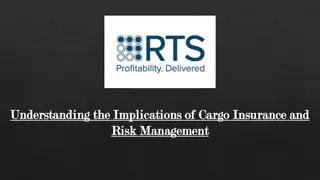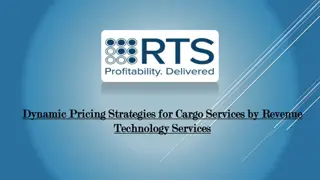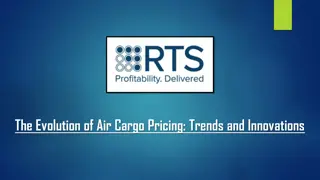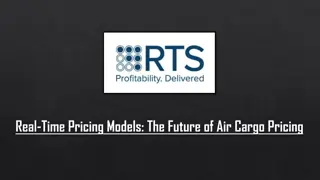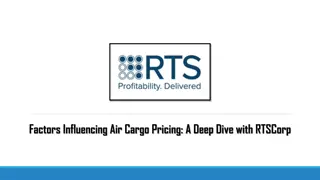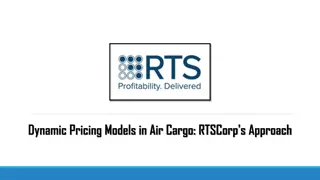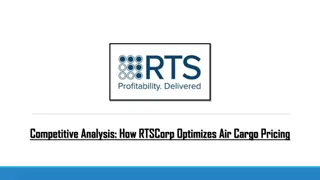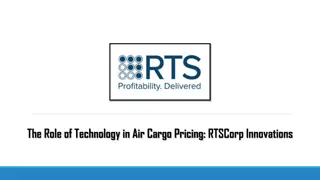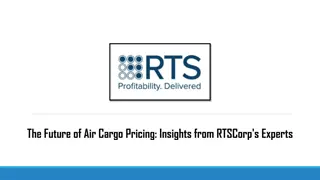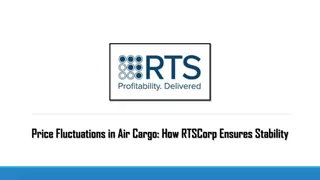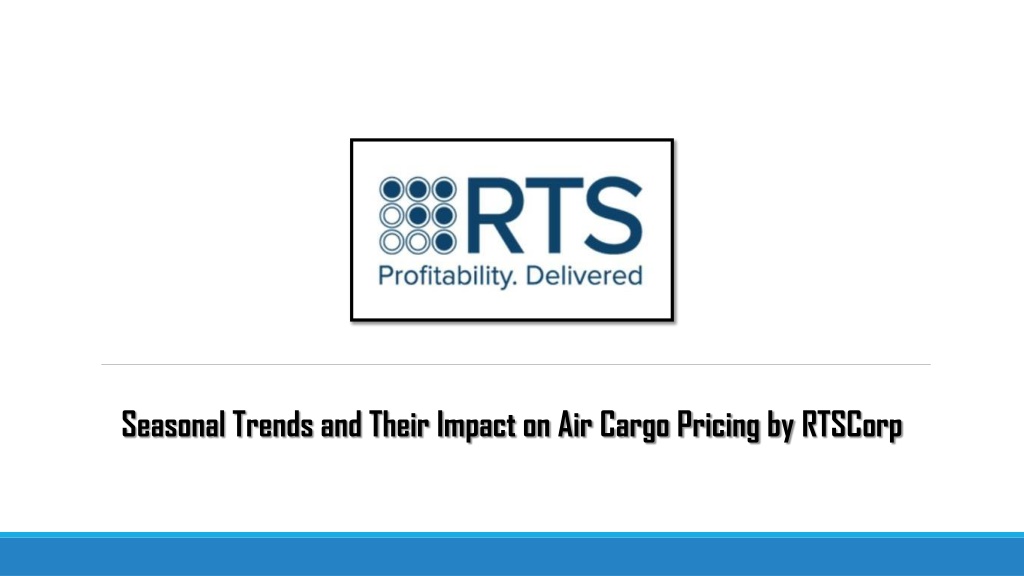
Seasonal Trends and Their Impact on Air Cargo Pricing by RTSCorp
Air cargo is a vital component of global trade, providing quick and efficient transport of goods across vast distances. However, one of the key factors influencing air cargo pricing is the impact of seasonal trends. These trends, which include peak h
- cargo cloud solutions
- cargo pricing
- cargo revenue management
- cargo solutions
- cargo strategy consulting
Download Presentation

Please find below an Image/Link to download the presentation.
The content on the website is provided AS IS for your information and personal use only. It may not be sold, licensed, or shared on other websites without obtaining consent from the author. Download presentation by click this link. If you encounter any issues during the download, it is possible that the publisher has removed the file from their server.
E N D
Presentation Transcript
Seasonal Trends and Their Impact on Air Cargo Pricing by RTSCorp
Air cargo is a vital component of global trade, providing quick and efficient transport of goods across vast distances. However, one of the key factors influencing air cargo pricing is the impact of seasonal trends. These trends, which include peak holiday seasons, weather changes, and market demands, can lead to fluctuations in shipping rates. RTSCorp, a leader in the air cargo industry, has developed advanced solutions to address these fluctuations, offering more stable and predictable pricing strategies.
Understanding Seasonal Trends in Air Cargo Pricing Air cargo pricing is influenced by various factors, including fuel costs, route availability, cargo weight, and demand. Seasonaltrends play a critical role, as certain periods of the year see increased demand for specific goods, which can cause a surge in air freight prices. For example, during the holiday season, there is a noticeable spike in air cargo pricing due to the high demand for transporting consumer goods, electronics, and perishables. Similarly, agricultural produce tends to see increased airfreight rates during harvest seasons, as businesses rush to transport fresh products to various markets. Peak Seasons and Their Influence Peak seasons, like the months leading up to Christmas, Black Friday, or Chinese New Year, create high demand for air cargo space, often resulting in increased prices. During these periods, businesses around the world rely on fast and reliable shipping to meet consumer demand. Consequently, the competition for cargo space pushes prices up. RTSCorp has identified these patterns and leverages technology to help clients plan their shipping schedules accordingly, minimizing cost impacts by advising on optimal shipping times.
Another example of a peak season is during the spring and summer months when fashion brands launch new collections. Retailers are keen to ship their products swiftly, leading to increased demand for air cargo services. This rise in demand results in higher air cargo pricing, as limited cargo space drives up costs. Understanding these seasonal peaks is crucial for businesses looking to optimize their shipping strategies. RTSCorp's Approach to Managing Seasonal Price Fluctuations RTSCorp addresses the challenge of seasonal air cargo pricing through a combination of predictive analytics and dynamic pricing models. By analyzing historical data and real-time market trends, RTSCorp's technology can forecast periods of high demand and anticipate when prices will increase. This enables clients to make informed decisions about when to ship their goods, potentially avoiding the peak prices by planning ahead or booking in advance. Moreover, RTSCorp s solutions allow for more dynamic adjustments, helping businesses respond to sudden changes in the market. For instance, if there is an unexpected surge in demand, their system can allocate resources efficiently, ensuring that clients can still find competitive rates even during peak periods. This approach minimizes the disruptions often associated with seasonal price changes.
Weather Patterns and Their Impact on Pricing Seasonal weather patterns also affect air cargo pricing. During winter, harsh weather conditions in certain regions can disrupt flight schedules, leading to delays and increased operational costs. These additional expenses often get passed on to customers, resulting in higher shipping rates. RTSCorp s advanced monitoring systems track weather patterns, helping clients anticipate disruptions and plan alternative routes or schedules to avoid additional costs. In contrast, during favorable weather conditions in the spring and summer, air freight operations tend to run more smoothly, which can lead to more stable pricing. By analyzing weather data alongside other factors, RTSCorp can provide a more comprehensive overview of the factors influencing air cargo pricing. Seasonal trends have a significant impact on air cargo pricing, influencing how businesses plan their logistics and transport strategies. Understanding these patterns is essential for companies looking to optimize their shipping costs and maintain efficiency. RTSCorp's innovative approach to air cargo pricing provides solutions that address these seasonal challenges by offering predictive insights, dynamic pricing, and real-time market analysis.
Conclusion With the integration of technology, RTSCorp has redefined how companies navigate the complexities of seasonal trends in the air cargo industry. By preparing for peak seasons, understanding weather- related disruptions, and utilizing data-driven insights, businesses can achieve more predictable and manageable air cargo pricing, ultimately enhancing their overall logistics strategy.



